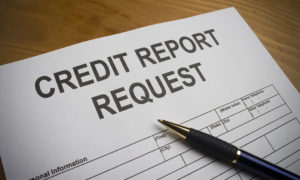Your credit report plays a critical role in your overall financial health. The information that it contains will affect your ability to get new lines of credit for auto or personal loans, rent an apartment, and sometimes even get a job or promotion. It’s important to understand all of the information on your report and what types of negative listings may appear.
Every person’s credit report has the following:
- Personal information. Your name, current and previous addresses, social security number, date of birth, and possibly current and previous employers.
- Credit accounts. Current and previous credit accounts including details such as payment history, credit limit, monthly payment amount, and current balance. Auto loans, student loans, credit cards, and any other type of credit accounts in your name will be listed.
- Inquiries. Hard inquiries are listed on your report when there is an application for new credit, and may remain on your report for up to two years. Several hard inquiries, which may be viewed by a lender as high risk, may lower your credit score and impact your ability to be approved for credit. Soft inquiries are listed by companies offering to promote a special product or service and do not hold negative weight on your report.
- Negative listings and public records. Late payments, debt, accounts in collection, repossessions, accounts in default, bankruptcies, foreclosures, and judgments are all listed on your credit report. Negative information can stay on your report for up to seven years and will lower your credit score. It may make it more difficult to get approved for new credit, or could result in higher interest rates on any loans or credit.
What you can do about negative listings
Negative listings on your credit report are frustrating, especially if you’re making an effort to improve your financial situation. Take steps to pay down debt over time.
-Monitor your credit reports
-Dispute errors with the credit bureau and credit furnisher
-Pay your bills in full and on time
-Make a budget and stick to it
These positive actions will help improve your credit and show that you’re on the right track, even while the negative listings remain.
Seek Legal Help
Flitter Milz is a nationally recognized consumer protection law firm that represents victims of car repossession, credit reporting errors and unfair debt collection practices. Contact Us for a free consultation to determine whether your consumer rights were violated.

 Credit reports impact many aspects of our lives. Whether we want to apply for a mortgage, obtain a car loan or credit card, rent an apartment or apply for a job, we must prove to a prospective creditor or employer, that we are financially responsible. Our credit report shows the history of our accounts and illustrates whether we may be a good credit risk.
Credit reports impact many aspects of our lives. Whether we want to apply for a mortgage, obtain a car loan or credit card, rent an apartment or apply for a job, we must prove to a prospective creditor or employer, that we are financially responsible. Our credit report shows the history of our accounts and illustrates whether we may be a good credit risk.  Flitter Milz is a nationally recognized consumer protection law firm that represents people who have been denied credit for a home, auto or personal loan, or possibly a job opportunity or promotion, due to a negative listing on a credit report.
Flitter Milz is a nationally recognized consumer protection law firm that represents people who have been denied credit for a home, auto or personal loan, or possibly a job opportunity or promotion, due to a negative listing on a credit report. Identity theft happens when someone uses your personal or financial information without your permission. It can damage your credit status and ability to utilize credit. If you suspect someone has stolen your identity, it’s important to take action immediately. The consequences can be disastrous, but following these steps will help secure your information and prevent your credit from getting tarnished by someone else’s actions.
Identity theft happens when someone uses your personal or financial information without your permission. It can damage your credit status and ability to utilize credit. If you suspect someone has stolen your identity, it’s important to take action immediately. The consequences can be disastrous, but following these steps will help secure your information and prevent your credit from getting tarnished by someone else’s actions. File a Police Report with the local police department and request a copy of the report for your files. A copy of the police report must accompany all disputes to the bank and or creditor.
File a Police Report with the local police department and request a copy of the report for your files. A copy of the police report must accompany all disputes to the bank and or creditor. When you discover suspicious charges or withdrawals on an account, immediately contact the bank or creditor and inform them that the charges were not made by you. Follow up the call with a letter confirming specific details of the issue. Keep a copy of all correspondence for your files.
When you discover suspicious charges or withdrawals on an account, immediately contact the bank or creditor and inform them that the charges were not made by you. Follow up the call with a letter confirming specific details of the issue. Keep a copy of all correspondence for your files. Identity Theft must be reported to the Federal Trade Commission through submission of an Identity Theft Affidavit. This form must be completed and signed in the presence of a law enforcement officer, then submitted to the Federal Trade Commission.
Identity Theft must be reported to the Federal Trade Commission through submission of an Identity Theft Affidavit. This form must be completed and signed in the presence of a law enforcement officer, then submitted to the Federal Trade Commission. After discovering suspicious activity on a credit card or bank account statement, contact the three main credit bureaus – Transunion, Experian and Equifax – to place a fraud alert on your credit file.
After discovering suspicious activity on a credit card or bank account statement, contact the three main credit bureaus – Transunion, Experian and Equifax – to place a fraud alert on your credit file. Request a copy of your credit report
Request a copy of your credit report After review of your credit reports and identification of accounts that do not belong to you, a Blocking Letter should be sent to the credit bureau. The Blocking Letter confirms:
After review of your credit reports and identification of accounts that do not belong to you, a Blocking Letter should be sent to the credit bureau. The Blocking Letter confirms: Organize your files with all information related to the identity theft. As each case of identity theft is unique, it can take months, or even years to untangle the fraud and restore your credit.
Organize your files with all information related to the identity theft. As each case of identity theft is unique, it can take months, or even years to untangle the fraud and restore your credit.






